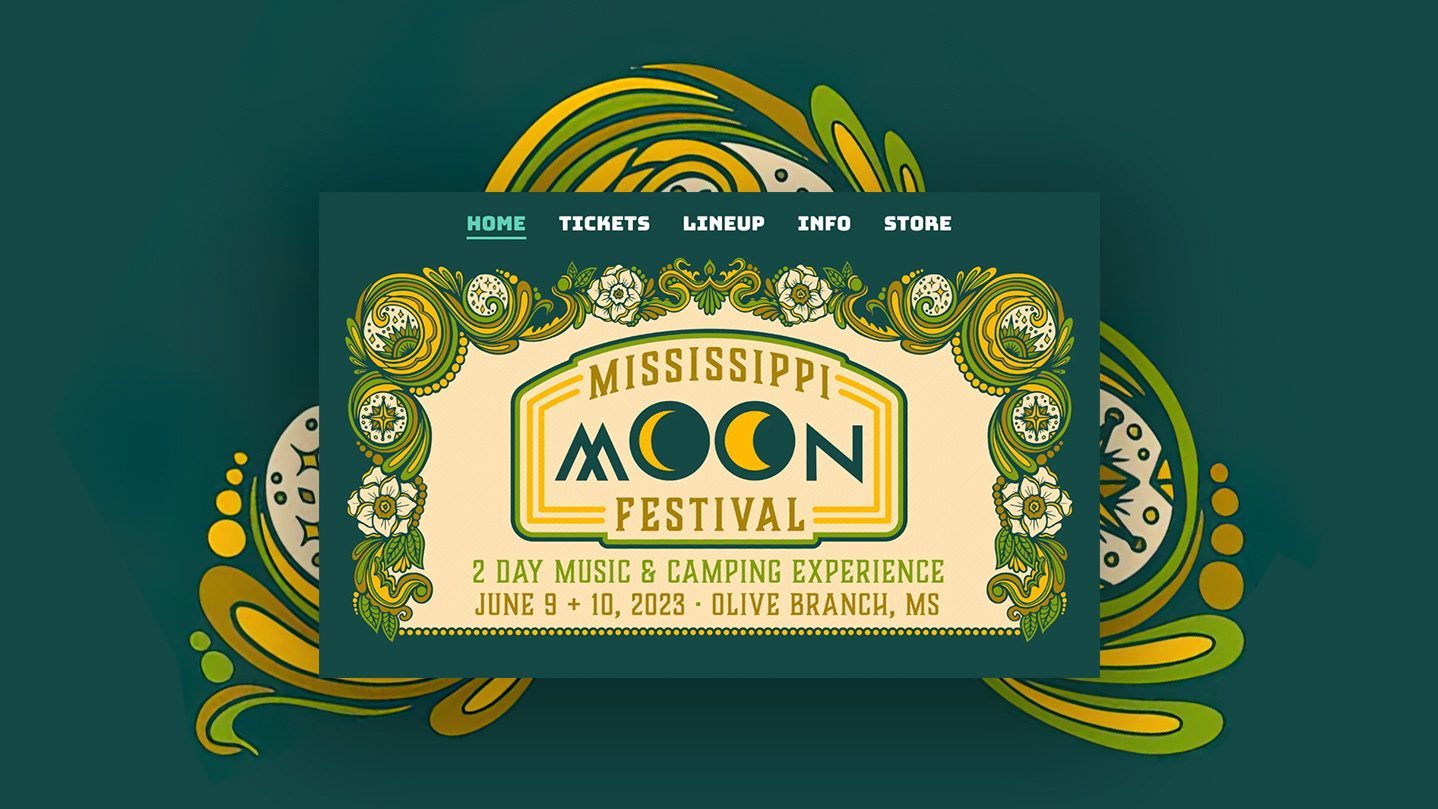 Music festivals have become a staple in the music industry, gathering thousands of fans in one location to watch their favorite bands. If you’re looking to promote your upcoming festival, it’s essential to have a strong online presence, and your music festival website can be the perfect tool to promote your lineup and boost attendance.
Music festivals have become a staple in the music industry, gathering thousands of fans in one location to watch their favorite bands. If you’re looking to promote your upcoming festival, it’s essential to have a strong online presence, and your music festival website can be the perfect tool to promote your lineup and boost attendance.
Bandzoogle is an ideal place to build your website. With beautiful music festival website templates, you can create a stunning online home for your festival in minutes. This post will guide you through some essentials needed for any music festival website design, along with a few examples.
Choose a template
When starting your website, begin by selecting a template that is right for your festival. Bandzoogle offers beautiful music festival templates with hundreds of variations to help you find the perfect fit. Our templates are customizable, so you can easily match your website’s colors and fonts with any logos or branding you’ve already established for your festival.
Within the Bandzoogle control panel, we’ve just added a new category for festivals. These hand-picked and updated website templates will guide you through the site-building process. Whether you’re an experienced web designer or this is your first website, you can quickly add all the elements that will draw fans to your festival.
Once your music festival website template is set up, you’ll add your pages and content. Creating a look that coordinates with your brand means you can re-use the same template in future years as well, simply updating the acts and information.
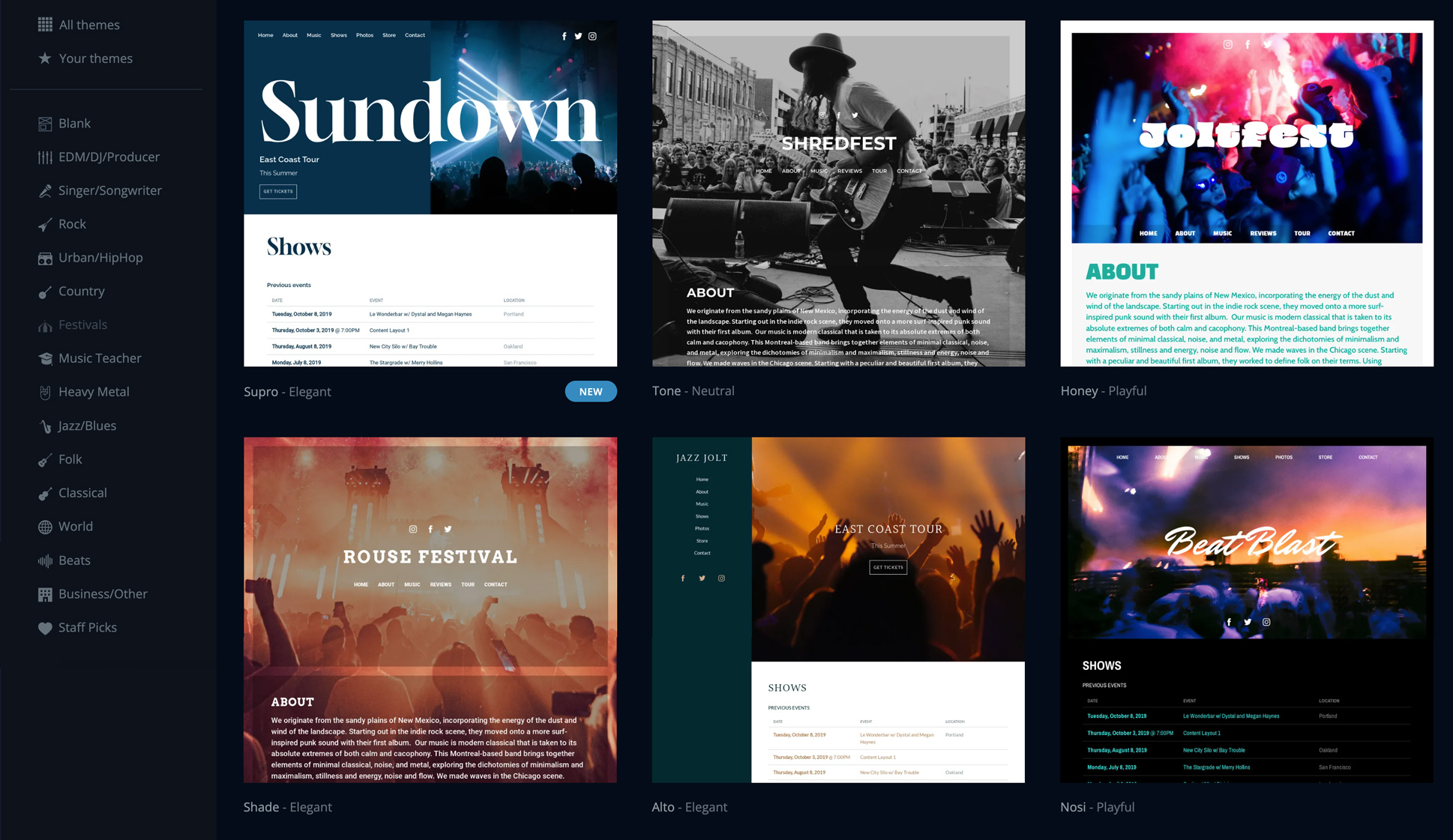
Create your homepage
When creating your homepage, be sure to have a great header image or header video. The header section will be what fans and potential audience members see first, so you’ll want to use an image that gives the best impression of what your festival offers.
Below your header area, you can add a ‘latest news’ section to the content section of your homepage. The Blog feature is the perfect tool to set this up. You can quickly post updates, notifying your website visitors about early bird deals and ticket pricing, lineup announcements, and any important details festival goers should know so they can have a great and safe experience at your festival.
Be sure to include a mailing list sign-up form on your homepage as well. This will help you to stay in touch with festivalgoers for the long term.
The Mississippi Moon Festival does a great job of using their website header to showcase their branding, the festival date and location, and what the festival offers, with clear and concise messaging: a 2-day music and camping experience.
They’ve customized their Bandzoogle festival website template to match the page colors and fonts to their logo, creating a beautiful website that complements their already-brilliant logo.
Make a mobile-ready music festival website that is easy to update. Build your website with Bandzoogle now!
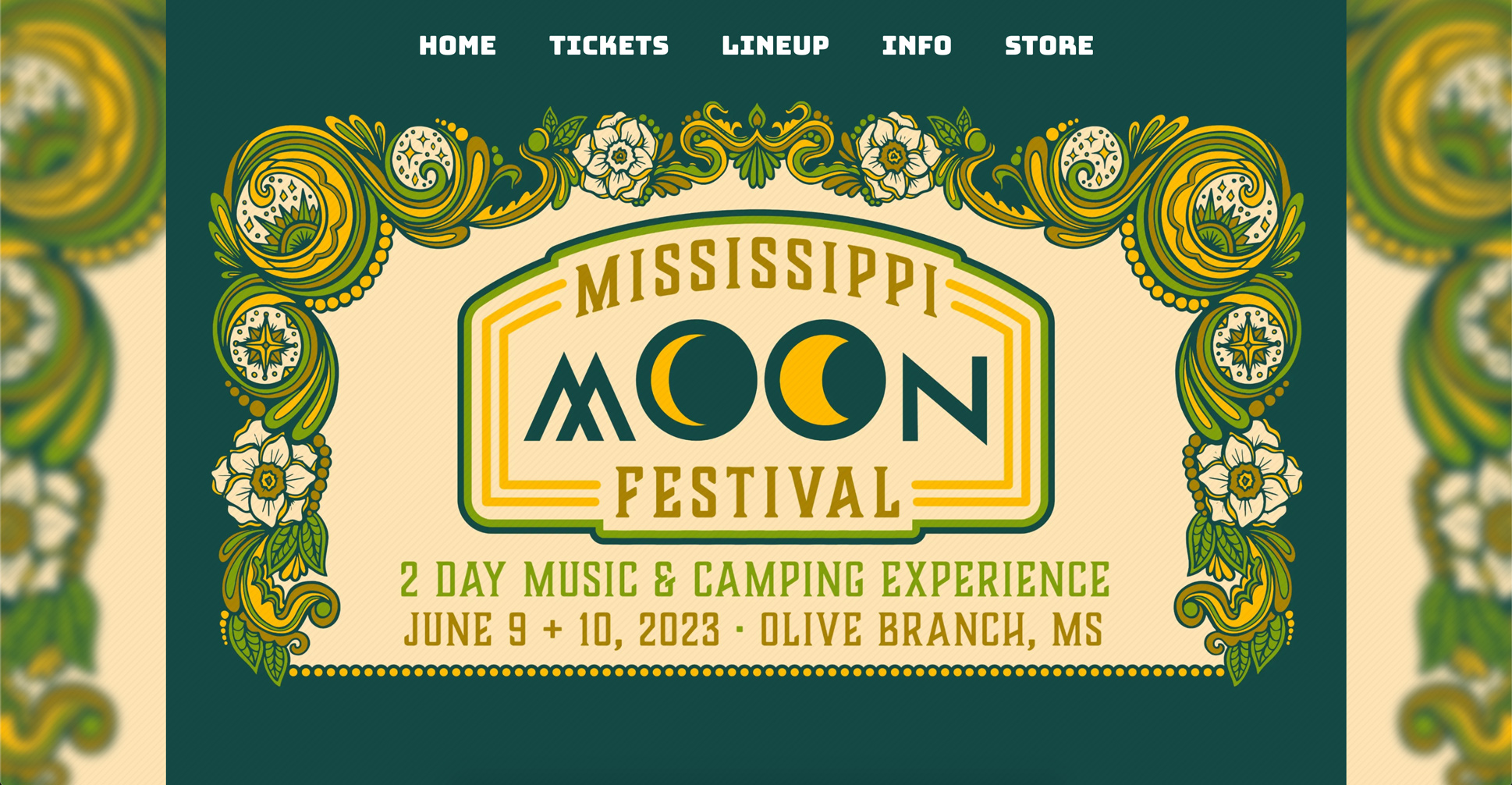 Music festival website example: Mississippi Moon Festival
Music festival website example: Mississippi Moon Festival
Add an About page
Having a page on your music festival website dedicated to the details and history of your festival is important. You can clarify the festival motto, and outline what music styles are at the focus of your festival, including details about past headliners. If you’re a grassroots festival supporting local talent and businesses, or you’re the hottest pop festival in the city, be sure to mention it on this page.
Insight about your goals and how you organize your festival can help to grow your reach and audience, as well as help secure sponsors who may be interested in supporting a festival that focuses on giving back to the community.
To shape your About page, add as much text as needed, breaking up the paragraphs into sections. You may also want to add a few images here, showing your festival in past years.
Share your lineup
If you’re running a festival, you’ve spent endless hours curating the perfect lineup, and you’ll want to make sure people can easily see which artists are playing.
Include a page to showcase your lineups, along with some insight into the acts. Here, you can feature each artist's recent press shot alongside a small bio about the band, and include links to Spotify and social media pages. This allows attendees to discover artists’ work ahead of time, creating a buzz about the next hot band that you’ve booked for this year’s festival.
If you’re applying to play at music festivals, be sure to supply the organizers with an Electronic Press Kit (EPK) that contains your bio, press shots, and videos. This ensures seamless promotion across a music festival website for all acts, encouraging fans to attend.
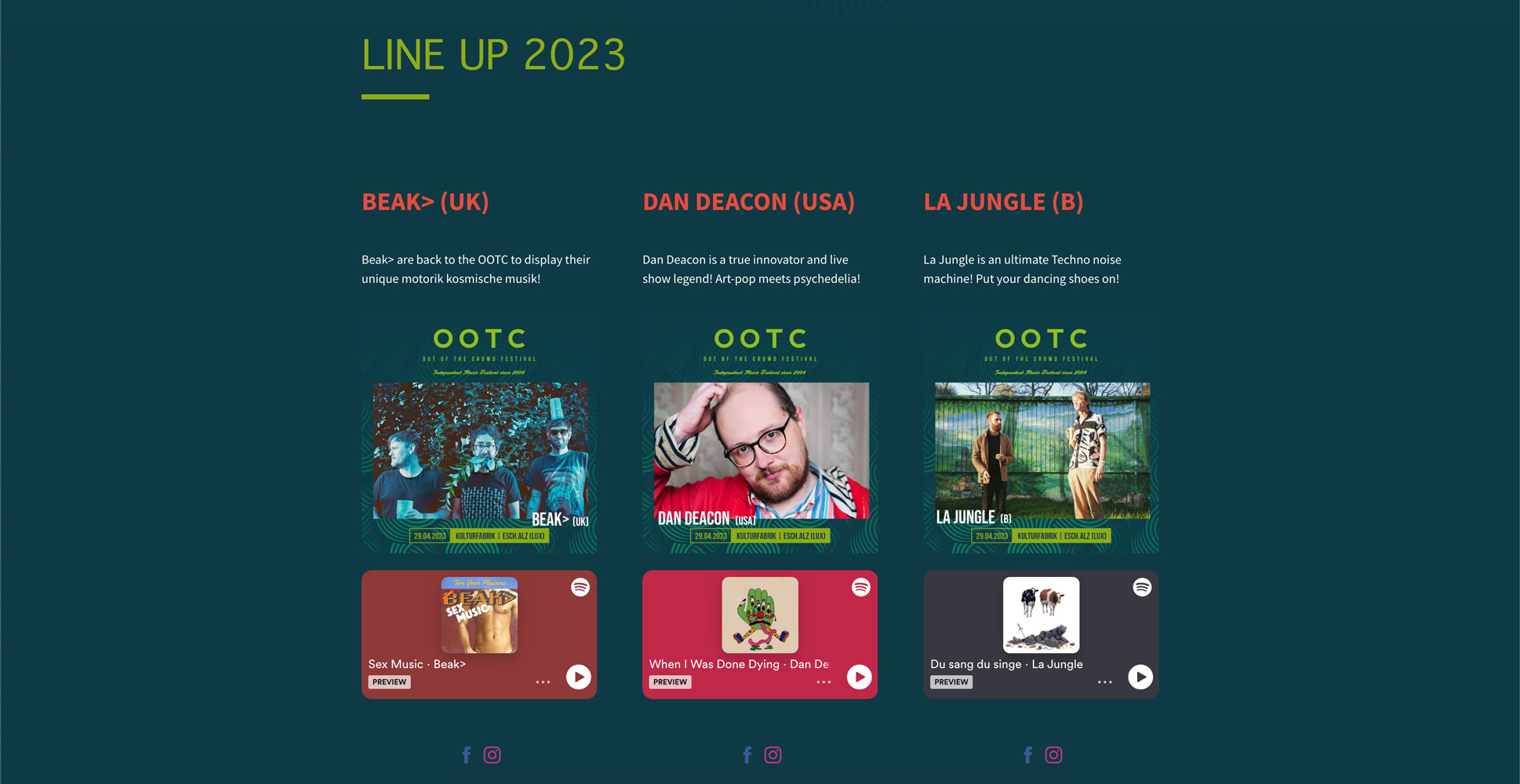 Music festival website example: Out Of The Crowd Festival
Music festival website example: Out Of The Crowd Festival
Sell tickets
Having a page dedicated to your festival ticket pricing is key to converting website visits into attendees. With Bandzoogle, you can sell event tickets directly through your website if you choose. Use the Calendar feature to share the dates of your festival and include daily pricing options or bundle packages for fans looking to attend each day of a multi-day festival.
FAQ page
A website page dedicated to frequently asked questions can help save a lot of time and resources as your festival approaches. You’ll need as much of your staff as possible committed to setting up the festival, making sure it’s all ready to start on time, and run as smoothly as possible. On an FAQ page you can describe the hours and timing, any festival entrance policies or age restrictions, vendors that will be on site, and more. Use headlines or bold text for the questions, and normal text for the replies underneath.
For a great example of an FAQ page, check out the Girls Rising Music Festival website. They’ve set up an FAQ page that provides all the festival policies to ensure the safety of everyone in attendance, and to inform people of the rules and regulations before they arrive. This way festival goers know what to expect, and can understand ahead of time what is acceptable to bring onto the festival grounds.
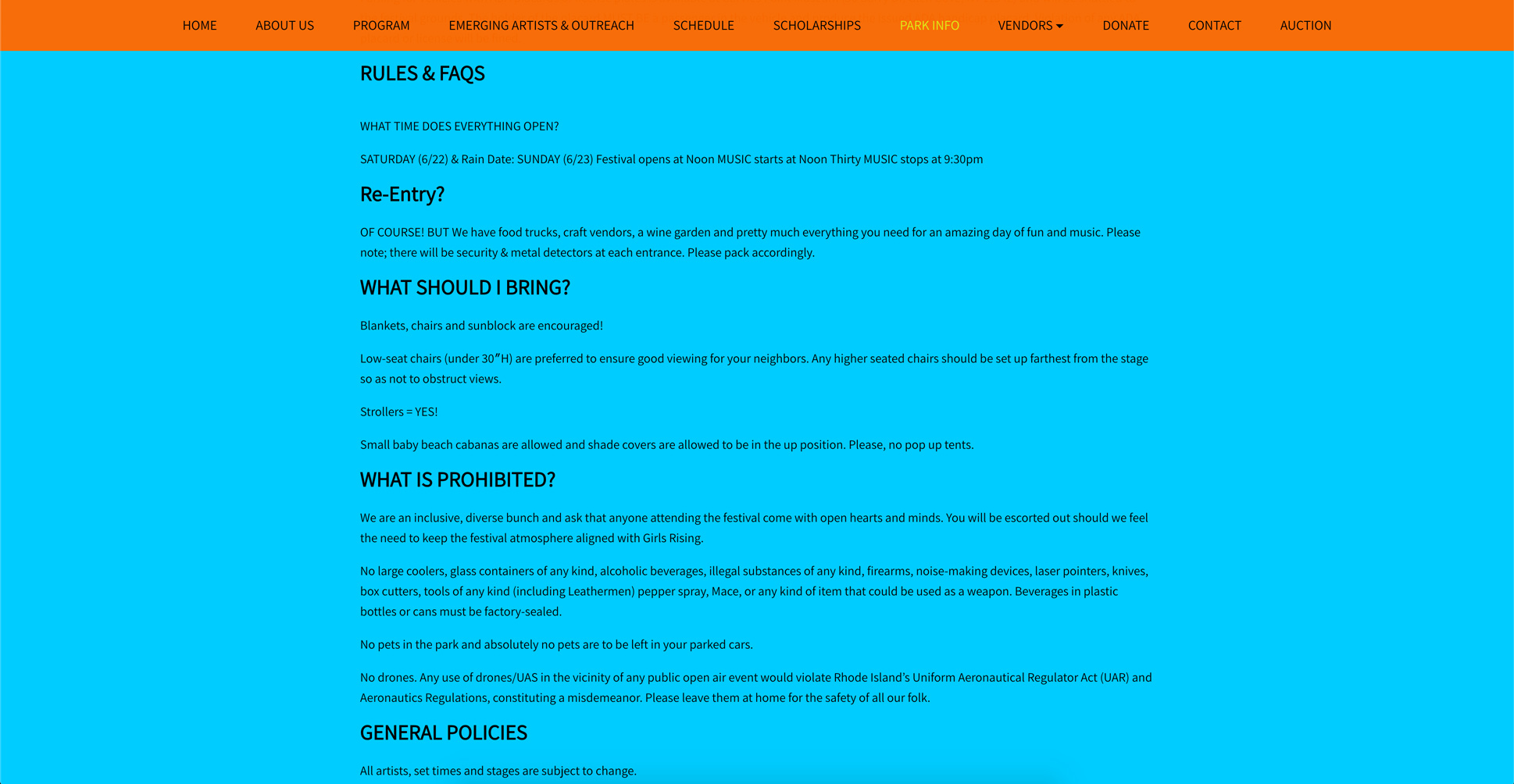 Music festival website example: Girls Rising Music Festival
Music festival website example: Girls Rising Music Festival
Experiences or panels
If your festival is offering conferences and panels, you’ll definitely want to showcase this on your website. Including details for these events will boost attendance, and show how you’re engaging musicians while building community. This page is optional, but if you are including workshops, showcases, or other opportunities for people to participate in the festival at large, adding plenty of detail will make things clear.
To see how this might work, check out the Civilized Fest website. They have created a page to promote their panels with beautiful flyers that are on theme with their logo and site wide branding. With a few clicks you can get details on the panel and subject matter, along with the location and start time.
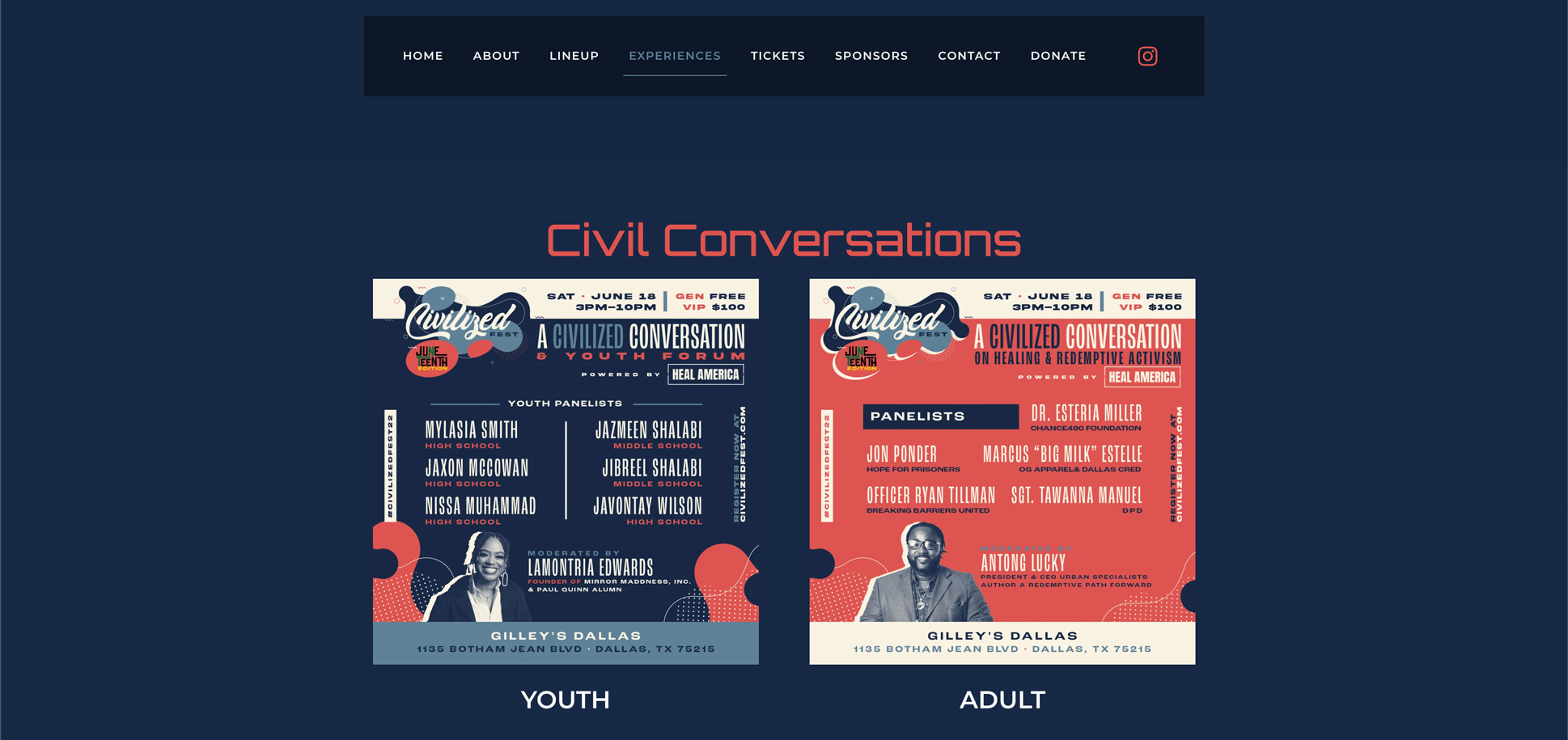 Music festival website example: Civilized Fest
Music festival website example: Civilized Fest
Connect your social media
Social media is an essential part of promoting your festival, and allows fans to easily engage with the festival. Bandzoogle makes it easy to integrate social media into your website, allowing you to add icons and links to your festival's social media pages via our My Sites feature.
The My Sites feature will display your social media links in a designated area on your website, which you can customize to reflect the colors of your template and match your festival’s branding.
Mention your sponsors
Many music festivals rely on donations and sponsorship. You’ll want to clearly acknowledge contributors in a visible way on your festival website. You can thank your sponsors on any page you’d like, including your About page, but to keep things simple, consider adding a site wide footer, which will appear at the bottom of every page. To that area, add logos of your sponsors with a link back to their websites if applicable.
Contact
Adding a designated Contact page to your website will make it easy for people to reach out with any questions and concerns. Place this page as the last item in your menu, so it’s quickly visible.
On your Contact page, you can designate a specific email address per contact form, or set up a list of contacts for those looking to inquire about booking a spot, purchase tickets, press, and more. This way you’re sure not to miss any outreach and you can provide quick support for anyone who may be hesitant in purchasing a ticket to your festival.
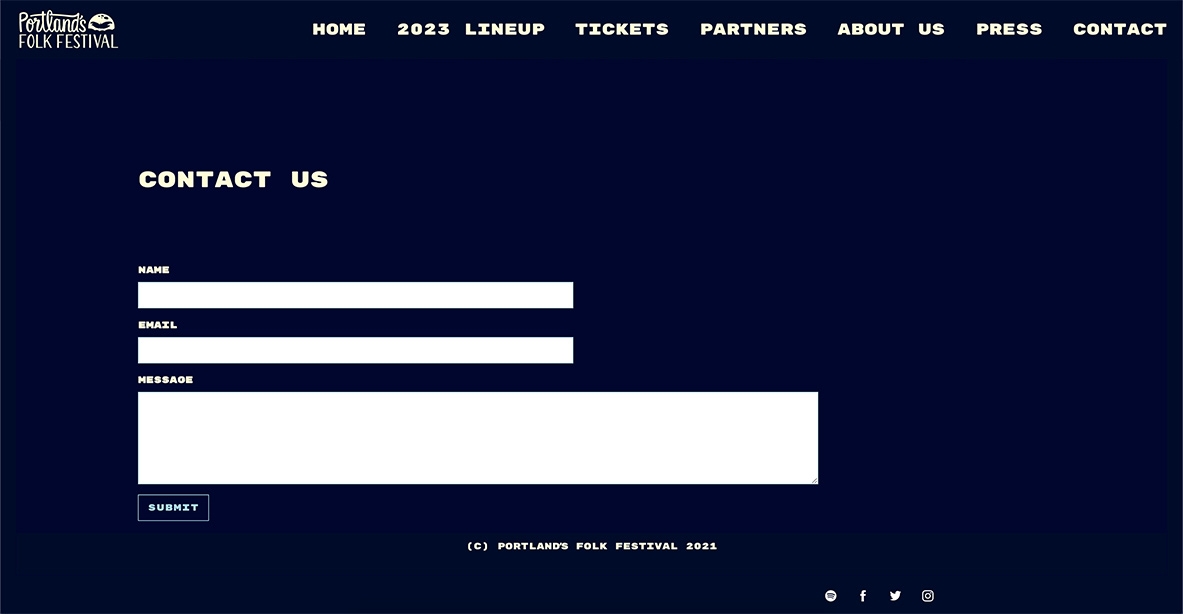 Music festival website example: Portlands Folk Festival
Music festival website example: Portlands Folk Festival
EPK
Electronic press kits are a great way to get some additional press and promotion to your festival. On your EPK page you can provide a history of the festival, highlight some of the biggest bands that have performed, describe attendance numbers and growth, and provide a promotional video that highlights exactly what your festival contributes to your city and community.
Making an EPK available on your website makes it easy for press outlets to gather the information they need to provide coverage and promotion for your festival. This may be especially helpful if your festival is just getting off the ground, and you are doing some local outreach. Setting up an EPK is easy and can help your festival grow and attract newcomers each year.
Putting on a music festival, no matter the scale, is no small undertaking. You’ll want to build a music festival website that supports your acts and helps you draw a crowd. We hope this guide helps you create your website step by step and leads towards the creation of a successful music festival, year after year.
Why not share this with your friends?
Build a stunning band website and store in minutes
- Promote your music on your own unique website.
- Sell music & merch directly to your fans. Keep 100%.
- Grow your fan base with built-in marketing tools.
Free 30 day trial, no credit card needed.


Comments
There are no comments yet.